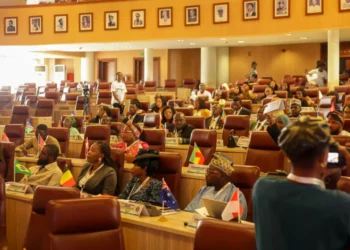
By Bartholomew Madukwe with Agency report
As Germany remembers five ethnic Turkish victims of a neo-Nazi arson attack 25 years ago, German Chancellor, Angela Merkel and Turkish Foreign Minister, Mevlut Cavusoglu, would attend ceremonies along with Mevlude Genc, 75, who suffered a huge loss during the country’s xenophobic violent period.
Genc lost two daughters, two granddaughters and a niece in the 1993 house fire, in the town of Solingen, Germany, which led to violent protests by Turks in several German cities.
Despite her loss, Genc called for reconciliation and later received Germany’s highest civilian honour, reports AFP.
The Solingen arson attack was one of the most severe instances of xenophobic violence in Germany.
On the night of 28-29 May 1993, four young German men (ages 16-23) belonging to the far right skinheadscene, with neo-Nazi ties, set fire to the house of a large Turkish family in Solingen in North Rhine-Westphalia, Germany.
In October 1995, the perpetrators were convicted of arson and murder and given prison sentences between 10 and 15 years. The convictions were upheld on appeal.
REUNIFICATION
In the early 1990s after German reunification, foreigners and especially asylum seekers were very controversial in Germany.
Several instances of anti-foreigner (xenophobic) violence preceded the Solingen attack. In December 1988, a German extreme-right militant, Josef Seller, set fire to the “Habermeier Haus” building in Schwandorf, Bavaria, killing the Turkish couple Fatma and Osman Can, together with their son Mehmet. The arson attack also took the life of a German citizen, Jürgen Hübner.
In September 1991, violent disturbances in Hoyerswerda forced the evacuation of an asylum seeker’s hostel. In November 1992, an arson in Möllnperpetrated by extreme-rightist youth killed three Turks.
In December 1992, large demonstrations protesting against xenophobia took place all over Germany, with over 700,000 participants. Several Neo-Nazi groups were outlawed by the end of 1992.
On 26 May 1993, three days before the attack, the German Bundestag had resolved to change the German constitution (the Grundgesetz) to limit the numbers of asylum seekers.
Previously, the constitution had granted every political refugee in the world a direct right to refugee status in Germany.
Turkey’s foreign ministry has voiced concern that “racism, xenophobia and Islamophobia are on the rise again in the EU country and called on politicians and media there to use prudent language.
CAMPAIGN BAN
While both Germany and Turkey will voice their common sorrow over the tragic deaths, tensions linger between
the governments of Merkel and President Recep Tayyip Erdogan, who faces elections on June 24.
Berlin has barred Turkish politicians from campaigning in the country home to three million ethnic Turks the largest diaspora abroad some 1.4 million of whom can vote in their ancestral homeland.
Several German politicians have cautioned that Cavusoglu must not use the memorial event to campaign for Erdogan’s AKP party or deepen divisions in the Turkish-German community.
After Erdogan last year slammed Germany’s “Nazi-style” ban on Turkish campaign speeches, Berlin imposed a blanket ban on political events by non-EU politicians within three months of elections in their countries.
Police at a Kurdish rally in Cologne last Saturday prohibited two former lawmakers of Turkey’s opposition HDP party from addressing the crowd.
German Foreign Minister Heiko Maas on Sunday reiterated Berlin’s position, while stressing that Cavusoglu’s speech would “not constitute election campaigning but commemorate the victims of this terrible attack”.
CEREMONY
Merkel, the two foreign ministers and victims’ relatives will from 1000 GMT attend a ceremony at the North Rhine-Westphalia state chancellery in Duesseldorf.
From 1400 GMT, Cavusoglu and Maas will join a ceremony in Solingen organised by the town hall, the Genc family, and local Muslim, Christian and civic organisations.





